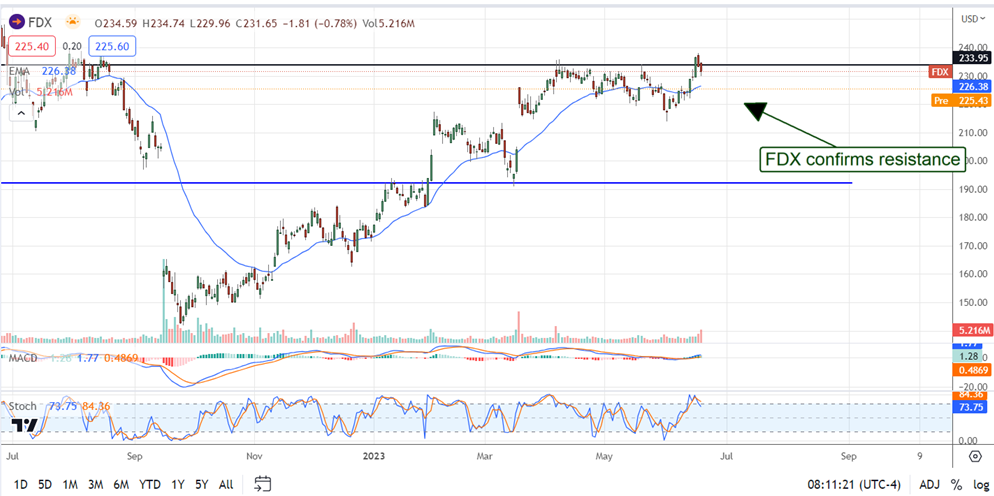- FedEx had a mixed quarter, and shares are moving lower.
- Internal efficiency is helping margins but revenue and volume fell.
- The guidance is favorable but comes with substantial risk.
FedEx (NYSE:FDX) Q4 report isn’t bad per se but is a sign of the times that suggests the economy and the S&P 500 will move sideways and not significantly upward over the next few quarters. The takeaway from the report can be summed up like this: margins, yay but revenue and volume, nay.
This means that internal efforts to offset declining volume are helping the bottom line, but the business is still in contraction. Better than expected is good, but declining revenue and volume is a shaky foundation to build a rally on. Given the uncertain nature of the economy, there is a significant chance that revenue and volume could be even weaker than expected in F2024.
FedEx Results Weigh On Shipping, Logistics Companies
FedEx results could be better. The company reported $21.9 billion in net revenue, a decline of 10.2% compared to last year. Higher pricing and internal efficiencies offset the decline, but the underlying theme through all 3 operating segments is that volume is down. FedEx Express revenue, the largest segment, fell by 3.25% and was offset by a slight gain in the Ground segment but was led by a larger decline in the Freight segment.
The company’s margin is the only good news in the report, but it is even down compared to last year. The GAAP and operating income margins shrank at least 100 bps to leave the adjusted EPS at $4.94. This is $0.07 better than expected but down 28% YOY. The margin news also led to improved guidance, which is a mixed bag.
The company expects F24 revenue growth from flat to up low-single-digits with a similar outlook for EPS. The EPS range of $15 to $17 tops the Marketbeat.com consensus estimate of $14.87 but wasn’t a strong enough catalyst to get the market to rise.
If the Fed’s higher-interest policy can be blamed for the decline in volume (it is supposed to curb demand), the outlook provided by FedEx may be optimistic. The Fed is expected to hike interest rates by at least 25 basis points by the end of the summer and could go as much as 50. In this light, volume demand will continue to weaken and undermine business for FedEx and most other businesses in the S&P 500.
FedEx Invests In Next-Gen Technology
FedEx didn’t refer to its CAPEX plans as investing in next-gen technology, but that is what it amounts to. The company is retiring old and underperforming assets in favor of newer, modern technology, including planes, vehicles, and automation. Ultimately, green technology, EVs, and AI. That will help drive business for the budding AI complex, focusing on commercial EVs, green energy, and automation stocks.
FedEx will also invest in capital returns. The stock will continue to pay its 2.2% dividend, and the company will repurchase shares. Repurchases amounted to 4% of the float in F2023, and there is still $2.6 billion under the current authorization. The company plans to repurchase $2.0 billion in F2024, about 3.4% of the pre-release market cap. This should help support the price action but at the bottom of the trading range.
The Technical Outlook: FedEx Confirms Resistance
Shares of FedEx fell more than 2.5% in premarket trading to confirm resistance at the top of a trading range. The move may find support at the short-term moving average, but that is no guarantee. A move below the EMA could take the stock down to the $220 level or lower. The analysts see an upside for the market, but the price targets started to fall before the Q4 release and should be expected to fall more over the summer.

